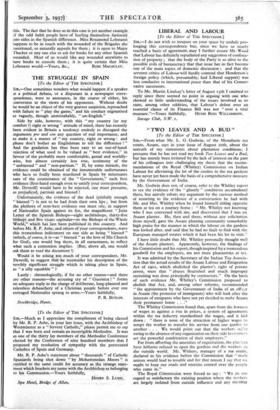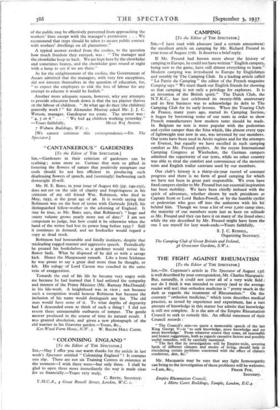" TWO LEAVES AND A BUD " [To the Editor
of THE SPECTATOR.] Sta,—From what Mr. L. G. Godwin, of the Monabarie tea estate, Assam, says in your issue of August zoth, about the untruth of my statements about plantation conditions,. I presume that he has not read my book Two Leaves and a Bud, but has merely been irritated by the lack of interest On the part of his colleagues into challenging my thesis that the recom- mendations of the Royal (Whitley) Commission on Indian Labour for alleviating the lot of the coolies in the tea gardens have never yet been made the basis of a comprehensive measure by the Government of India.
Mr. Godwin does not, of course, refer to the Whitley report to see the evidence of the " ghastly " conditions accumulated there, but naively rebuts my argument by the curious method of resorting to the evidence of a conversation he had with Mr. and Mrs. Whitley when he found himself sitting opposite them at tea on a journey home : " Mr. Whitley not knowing who I was conversed with me, and discovered that I was an Assam planter. He, then and there, without any solicitation from myself, gave the Assam planting community remarkably high praise for the manner in which the labour on the gardens was looked after, and said that he had no fault to find with the. European managed estates which it had been his lot to visit."
I have little doubt that Mr. Whitley personally thought well of the Assam planters. Apparently, however, the findings of his Commission and his report, though inspired by a tremendous goodwill for the employers, are not mere pleasantries at tea.
It was admitted by the Secretary of the Indian Tea Associa- tion that the actual results of the Assam Labour and-Emigration Act of. roc) 1, which abolished the planter's right of private arrest, were that " abuses flourished and much improper recruiting' was done principally by contractors." On the basis of such evidence Mr. Whitley's Commission proposed to abolish that Act, and, among other reforms, recommended " the appointment by the Government of India of an off czr in Assam (the protector of immigrants) who will look after the interests of emigrants who have not yet decided to make Assam their permanent home . . ."
The Whitley Commission found that, apart from the lowness of wages as against a rise in prices, a system of agreements within the tea industry standardised the wages, and it laid down : " there is none of the attraction of higher wages to tempt the worker to transfer his service from one garden to another . . . We would point out that the workers suffer owing to the absence of any organisation on their side to counter- act the powerful combination of their employers."
Far from affording the amenities of organisation, the plar_ters have hitherto refused to open the gardens and the workers to the outside world. Mr. Withers, manager of a tea estate, declared in his evidence before the Commission that " trade unions would lead to trouble and for that reason I say that we ought to keep our roads and exercise control over the people who come in."
The Royal Commission were forced to say : " We do not regard as satisfactory the existing position where the workers are largely isolated from oufside influence and any member of the public may be effectively prevented from approaching the workers' lines except with the manager's permission . . . We recommend that steps should be taken to secure public contact with workers' dwellings on all plantations."
A typical answer evoked from the coolies, to the question how much freedom they enjoyed, was : " The manager and the chowkidar keep us back. We are kept here by the chowkidar and sometimes beaten, and the chowkidar goes round at night with a lamp to see if we are there."
As for the enlightenment of the coolies, the Government of Assam admitted that the managers, with very few exceptions, did not interest themselves in the question of education, for, " to expect the employers to risk the loss of labour for any attempt to educate it would be foolish."
Another more adequate reason, however, why any attempts to provide education break down is that the tea planter thrives on the labour of children. " At what age do they (the children) generally work ? " Sir Alexander Murray asked Mr. J. J. C. Watson, manager, Gandrapur tea estate. The answer was : " 4, 5 or 6 " . . . " We had 44 children working yesterday."
7 Woburn Buildings, W.C. r.
. . [We cannot continue this correspondence.--En. The Spectator.]











































 Previous page
Previous page